Article 84: The West and the establishment of a new coffee culture
Rituals for enjoying coffee first appeared in Africa, but the West has reshaped, creating a coffee civilization that has had a profound influence on human life.
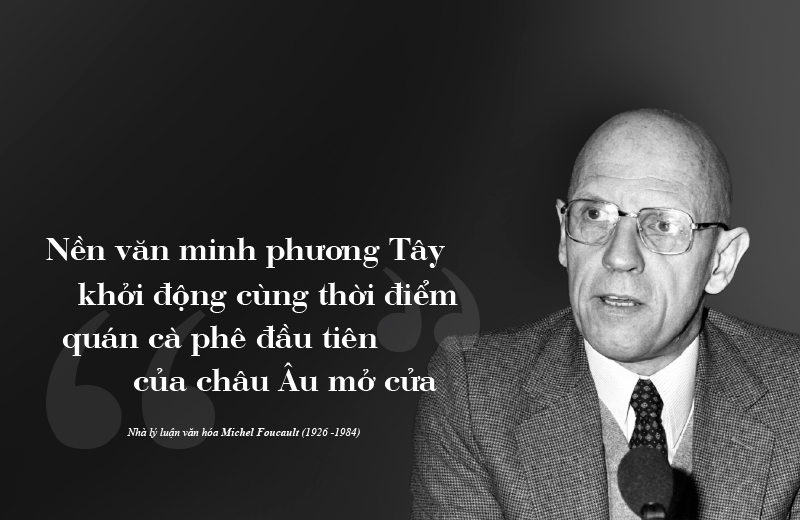
“Western civilization started at the same time when Europe’s first coffee shop opened.” – Cultural theorist Michel Foucault (1926 – 1984)
Not just a drink, coffee is a lifestyle
Material civilization is one of the means for the progress of the human world. However, the humanity of matter only exists when that material life helps people see the value of spirit in the essence of matter, creating conditions for people to aim for higher goals. This means matter must contain spirit and spirit needs matter to promote itself.
In that sense, coffee is never just coffee. Each type of coffee has different rituals, cultural depths, symbolic values, etc. Even the nature of the cup used to drink coffee contains a message of its own, turning coffee into a means of expressing thoughts, the soul of human life. Therefore, an individual’s choice of coffee is always indicative of their culture and lifestyle.
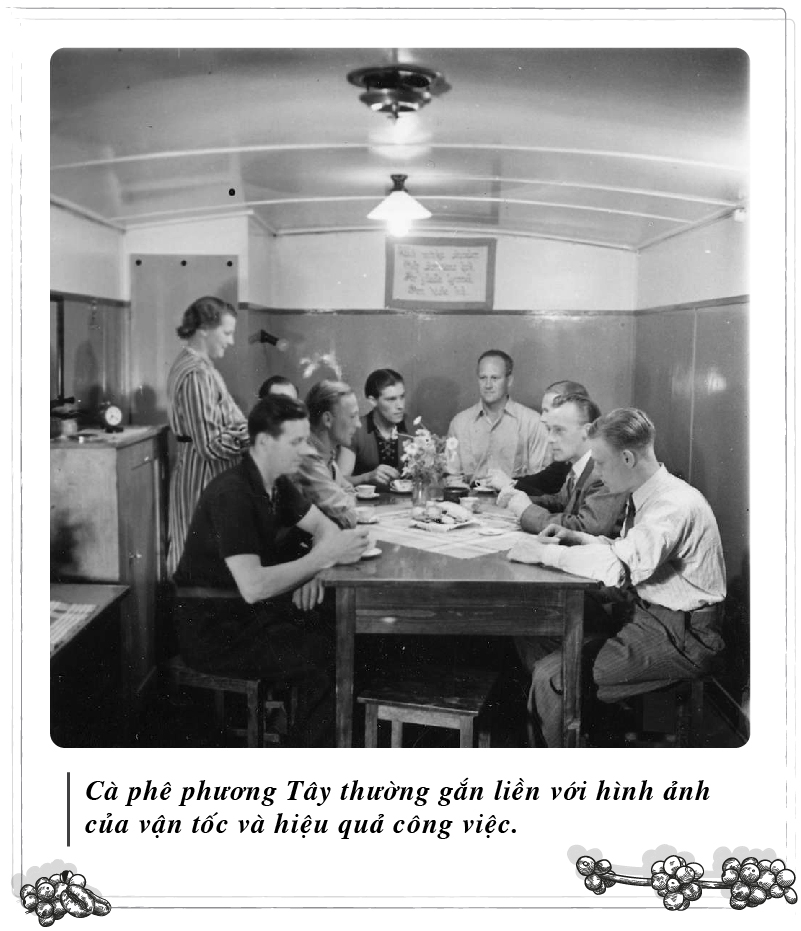
Western coffee is often associated with the image of speed and efficiency.
In creating symbolic value for coffee, Western producers have referenced cultural identity, artistic values, and its utility to man’s interaction with nature. The Western style of enjoying coffee, typically Italy’s Espresso, has been created from the human perspective, cosmology, and self-consciousness about the quest for identity of a large number of countries in the West.
Let us use comparisons for clearer identification. Chinese tea culture is imbued with Confucianism, Taoism and Buddhist philosophy. The way of enjoying tea is the full embodiment of the moral and ritual concepts of the three religions. The order of preparing the tea from the tea itself, the surrounding space, the preparation time, the drinking cups as well as the tea set are all in harmony to create the context of reaching the ritual – the essence of a life of virtues. The basic content of the Japanese Tea Ceremony is defined by the philosophies of Zen Buddhism. Enjoy tea but not enjoy tea, because the mystery is not in the taste but is revered in the purity and harmony in the movement of tea preparation. Tea has been valued more than a drink, enjoying tea contains a whole life philosophy, cultivating the mind to find oneself. That is the spirit of the East.
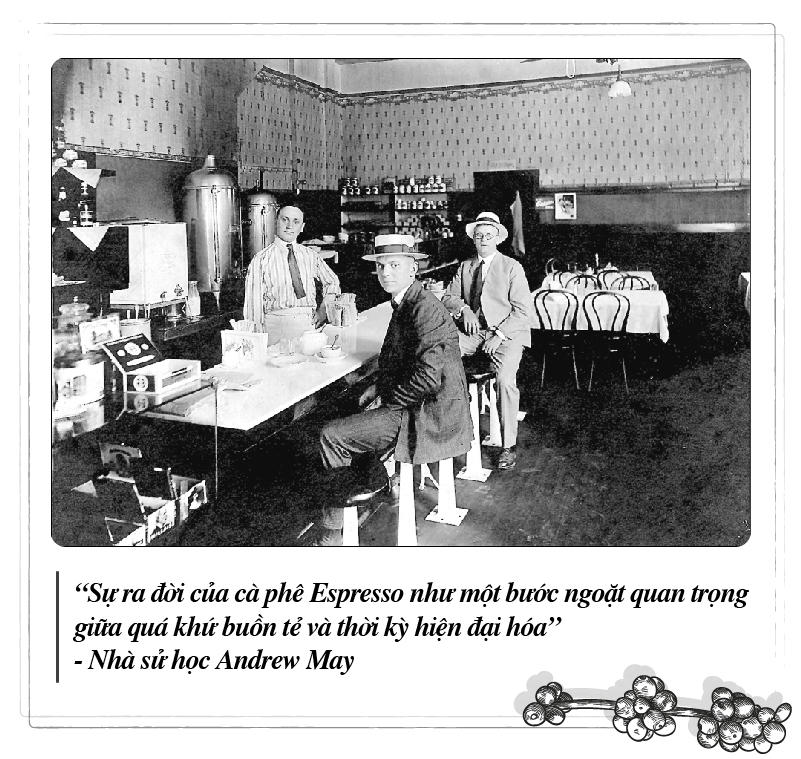
“The birth of Espresso was an important turning point between the dreary past and modernization.” – Historian Andrew May
Western civilization attaches great importance to the ability to conquer foreign objects and freedom of thought. Human dignity is first the awakening of each person to the nature of things, creating step by step expanding the frontiers of science, creating social prosperity. In the modern era, Western civilization has made leaps and bounds, far surpassing any other civilization. Nearly every invention that has had a profound effect on human life originated in the West. Especially since the end of the 18th century, the industrial revolution that took place in Europe on an unprecedented scale has completely changed society in terms of both material and spiritual values.
The Industrial Revolution gave rise to a wave of industrialization, honoring the power of science and technology. Individual freedom gradually prevailed, people lived by rational choice rather than conforming to the theological philosophies that dominated the Western world more than a thousand years ago. The creative products from this period provide exceptional value because they contribute to the resolution of desires and a high degree of self-consciousness. Universal products function as cultural symbols, bringing enlightenment in thinking, sowing seeds for a new transformation of value system, new way of life. Coffee was also among them.
Western coffee culture format
At the end of the 19th century, coffee began to move from an Ottoman-style product to an industrial product that symbolized Western civilization. Inventors applied steam engine achievements to invent coffee-making equipment. In 1844, Angelo Moriondo patented the first coffee machine to use steam. In 1906, Luigi Bezzera and Desiderio Pavoni refined Moriondo’s design and introduced the world to “Caffè Espresso – the coffee that can be served instantly”, ushering in the era of Roman coffee civilization.
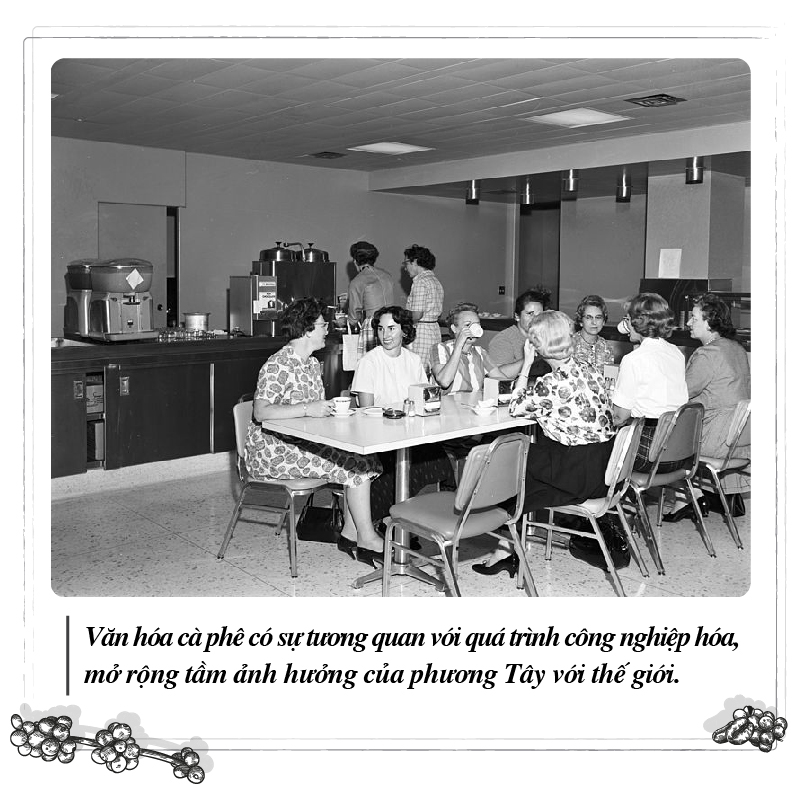
Coffee culture has a correlation with the process of industrialization, expanding the influence of the West to the world.
By the 1930s, espresso had spread throughout Europe and Latin America. As coffee became a mass consumer good in the 20th century, nationally identifiable coffee styles developed throughout the West and began to draw regional boundaries. The Germans have a Melitta paper filter. Italians have more Moka kettles. The French have a French Press coffee maker. Americans have Mr. Coffee and instant coffee…
Technology is fundamental to advances in Western coffee production, but this in itself is not enough to create a cultural tipping point for coffee enjoyment. The Western Coffee Revolution is the story of a series of changing social behavior and cultural practices around it. Naturally, people accept or not accept a product when they realize the value conveyed in the product is closely related to their own survival and development. Coffee carries with it the energy to promote the creative qualities of people, so it was chosen as the “standard” drink in the leapfrog period of the West.
Since the dawn of human civilization, the 20th century has been a time when technology and social sciences both reached full intellectual maturity, more advanced than all the previous centuries combined. The process of the technical revolution spawned new work processes and organizational forms. Machines are used in all areas of manufacturing, and supply chains are increasingly complex. Society transformed towards industrialization, urbanization and massification. To ensure viability, competitiveness and development, countries are forced to strengthen the capacity of creation, intellectual exchange and socialization of knowledge. It can be said that innovation capacity is an important resource to improve a country’s position and perhaps a decisive factor for the expansion of its economic influence.
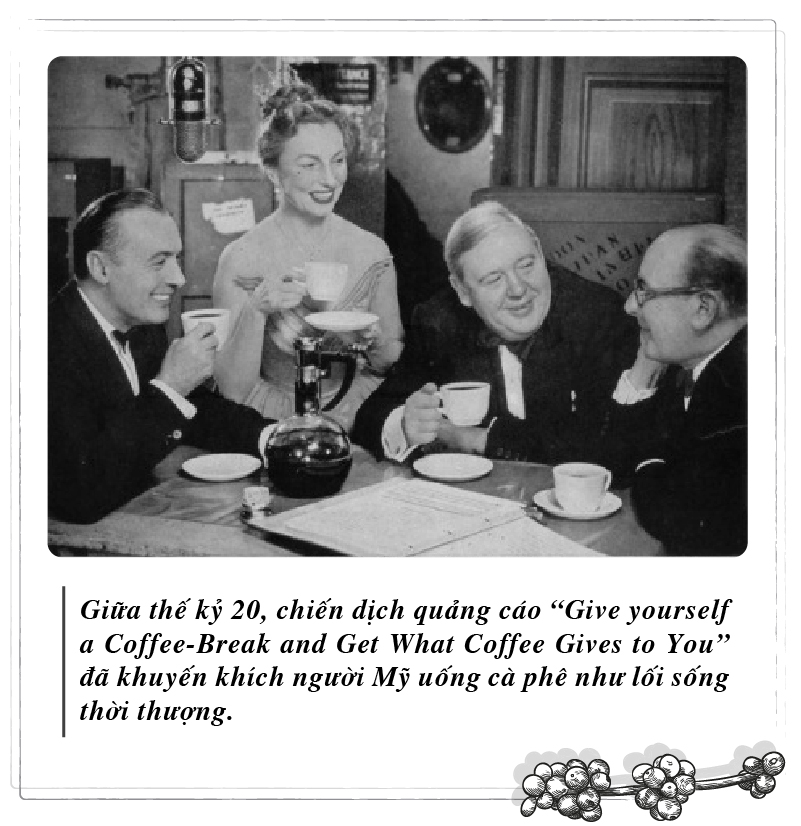
In the mid-20th century, the advertising campaign “Give yourself a Coffee-Break and Get What Coffee Gives to You” encouraged Americans to drink coffee as a fashionable lifestyle.
Along with the domination of a part of the creative force, a new generation of coffee has been formed. If the scientific and industrial age has completely changed the way coffee is prepared and enjoyed, then in turn, coffee is an essential catalyst for the operation of an industrialized society, originally on the philosophy of discipline and speed of the economy. At the same time, coffee is also the energy that promotes creativity and intellectual sublimation – essential properties for people to achieve their own tomorrow.
The culture of enjoying coffee has increased significantly in terms of quality and quantity, both in the home and in the restaurant. Coffee is present all over the street, in offices, factories, kitchens of households, is drunk in black form or mixed with other ingredients such as sugar, milk, cream, etc. Coffee is an intrinsic part of Western culture, so much so that this drink has become a staple consumer product, widely mediated, praising an active, creative, and committed lifestyle. In the second half of the 20th century, when it was found that coffee improved work performance significantly, the culture of “coffee break” was popular not only in Europe and America but also influenced all over the world.
Coffee culture has contributed significantly to the development of a rational way of life, the worship of creativity and individualism in the history of Western society. From continuously innovating increasingly advanced coffee-making technology, along with developing a variety of coffees to suit the desires of each specific customer class such as “ethical coffee”, “single-origin coffee”, “specialty coffee”, “coffee aroma” … Western coffee has made great strides, then influenced other cultural trends across the globe.
THE REAL COFFEE
ROASTED ONLY FOR PEOPLE OF WISDOM!
Source: “The Philosophical Way of Coffee” – copyright by Trung Nguyen Legend
Coming up: Coffee in the operation of soft power.


